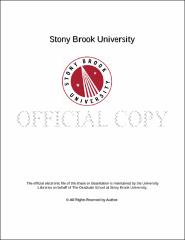| dc.identifier.uri | http://hdl.handle.net/11401/77589 | |
| dc.description.sponsorship | This work is sponsored by the Stony Brook University Graduate School in compliance with the requirements for completion of degree. | en_US |
| dc.format | Monograph | |
| dc.format.medium | Electronic Resource | en_US |
| dc.language.iso | en_US | |
| dc.publisher | The Graduate School, Stony Brook University: Stony Brook, NY. | |
| dc.type | Thesis | |
| dcterms.abstract | The presented Thesis asserts Patrick McHale’s Over the Garden Wall as a Modern Epic. It identifies the piece as Dantesque in its structure of a journey through an underworld, while noting that Dante is not the hero of his own epic. The argument is made that while Dante is too inactive in determining his fate to be given the title of epic Hero, McHale’s protagonists Wirt and Greg follow the structure of epic heroes, of the ancient tradition. The purpose of two protagonist on the same personal journey that is a spiritual odyssey, is maintained as a catalyst that allows for the role of epic hero to be fulfilled. The second section of this text compares the condition of those residing within the Unknown to those who face cyclical punishment within Dante’s Inferno and identifies the significance of specific sinners encountered by the heroes. One of these being Beatrice, who is argued to serve as both guide and a shattered morality seeking to be repaired. Thirdly there is a large focus on the role of burden in Over the Garden as it is the fear of burden which acts as a major threatening force to Wirt’s ability to reach his epic climax and assume his role of epic hero. Greg’s role as a catalyst for Wirt’s transformation is also discussed as Wirt is compared to the likes of Aeneas and Odysseus. The largest part of this comparison is Wirt’s similar active pursuit of his destiny which contrasts greatly to Dante’s consistent role as the delivered and not the deliverer. These ideas are expanded upon within the fourth section which also explores the key element of descent into the underworld, in ancient epics and their culmination in epiphany. The penultimate discussion leads with an argument for the Beast mirroring Satan as the figure has appeared in literature of antiquity. Additionally this section describes Wirt’s epic climax further placing him line with the likes of Odysseus and removing him from the likes of Dante the traveler. As this text concludes Wirt is acknowledged as self-delivered and deliverer. | |
| dcterms.abstract | The presented Thesis asserts Patrick McHale’s Over the Garden Wall as a Modern Epic. It identifies the piece as Dantesque in its structure of a journey through an underworld, while noting that Dante is not the hero of his own epic. The argument is made that while Dante is too inactive in determining his fate to be given the title of epic Hero, McHale’s protagonists Wirt and Greg follow the structure of epic heroes, of the ancient tradition. The purpose of two protagonist on the same personal journey that is a spiritual odyssey, is maintained as a catalyst that allows for the role of epic hero to be fulfilled. The second section of this text compares the condition of those residing within the Unknown to those who face cyclical punishment within Dante’s Inferno and identifies the significance of specific sinners encountered by the heroes. One of these being Beatrice, who is argued to serve as both guide and a shattered morality seeking to be repaired. Thirdly there is a large focus on the role of burden in Over the Garden as it is the fear of burden which acts as a major threatening force to Wirt’s ability to reach his epic climax and assume his role of epic hero. Greg’s role as a catalyst for Wirt’s transformation is also discussed as Wirt is compared to the likes of Aeneas and Odysseus. The largest part of this comparison is Wirt’s similar active pursuit of his destiny which contrasts greatly to Dante’s consistent role as the delivered and not the deliverer. These ideas are expanded upon within the fourth section which also explores the key element of descent into the underworld, in ancient epics and their culmination in epiphany. The penultimate discussion leads with an argument for the Beast mirroring Satan as the figure has appeared in literature of antiquity. Additionally this section describes Wirt’s epic climax further placing him line with the likes of Odysseus and removing him from the likes of Dante the traveler. As this text concludes Wirt is acknowledged as self-delivered and deliverer. | |
| dcterms.available | 2017-09-20T16:52:57Z | |
| dcterms.contributor | Thompson, Roger | en_US |
| dcterms.contributor | Robinson, Benedict | en_US |
| dcterms.creator | Wilson, Justine Nicole | |
| dcterms.dateAccepted | 2017-09-20T16:52:57Z | |
| dcterms.dateSubmitted | 2017-09-20T16:52:57Z | |
| dcterms.description | Department of English. | en_US |
| dcterms.extent | 45 pg. | en_US |
| dcterms.format | Application/PDF | en_US |
| dcterms.format | Monograph | |
| dcterms.identifier | http://hdl.handle.net/11401/77589 | |
| dcterms.issued | 2015-12-01 | |
| dcterms.language | en_US | |
| dcterms.provenance | Made available in DSpace on 2017-09-20T16:52:57Z (GMT). No. of bitstreams: 1
Wilson_grad.sunysb_0771M_12645.pdf: 1232921 bytes, checksum: e6a131d2ca9bd5991a82a149313d60c2 (MD5)
Previous issue date: 1 | en |
| dcterms.publisher | The Graduate School, Stony Brook University: Stony Brook, NY. | |
| dcterms.subject | Classical literature | |
| dcterms.subject | Dante, Dante's Inferno, epic hero, modern epic, Over the Garden Wall, Patrick McHale | |
| dcterms.title | Heroes In Patrick McHale's Over the Garden Wall | |
| dcterms.type | Thesis | |

